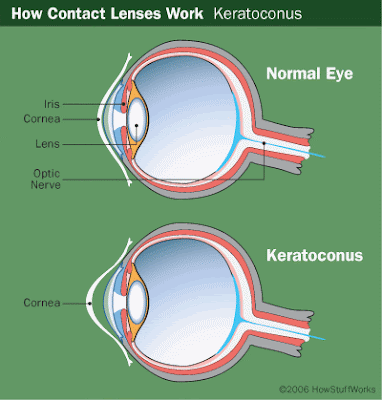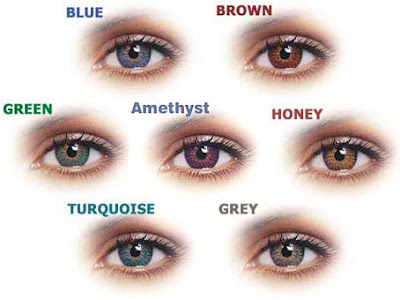

Who can wear contact lenses?
Most people can. Recent advances in contact lenses include astigmatism-correcting lenses, bifocals, daily disposables, and frequent-replacement lenses. Whether you're nearsighted or farsighted, older or younger, you can probably wear some type of contact lens.
Are contact lenses good for my eyes? Can they cause damage to the cornea?
Contact lenses have proven to be a healthy vision option for millions of people. But only your eyecare professional can determine if they are healthy for you. If you follow all prescribed steps for inserting, removing, and caring for them, contact lenses will continue to be safe and effective. You also need to see your eyecare professional regularly to insure long-term corneal health.
At what age can contact lens wear begin?
As soon as the need for vision correction is identified, contact lenses are a viable option. In fact, they have frequently been used in premature infants, who sometimes have vision problems. With proper care and lens maintenance, infants, young children, teens, and adults of all ages can wear contacts effectively. If you're a parent, click here for more information.
Should I wear contact lenses while playing sports?
Sports vision doctors agree that contact lenses are the best vision correction option for athletes. They can enhance visual skills like depth perception, peripheral awareness, and eye-hand/eye-foot coordination. Unlike glasses, contacts offer athletes a competitive advantage because they stay in place under dynamic conditions, provide a wider vision field, and eliminate the risk of glasses-related injuries. Contact lenses also make it easy to wear protective goggles.
Is it true that some contact lenses can actually slow or control nearsightedness?
Many contact lens specialists agree that GP contact lenses, which are made of firm plastic, may slow the progression of nearsightedness (myopia), whereas spectacles or soft contact lenses offer no such benefit. Myopia control is one reason why GP contacts are an excellent choice for many school-aged children and teens. Various eyecare practitioners are continuing research in this area.
If I have astigmatism, can I wear contact lenses?
Yes. Astigmatism is distorted vision caused by an irregularly shaped cornea. Contact lenses that correct astigmatism are called torics, and they come in both soft and GP contact lens materials. GP contacts tend to work better for astigmatism, because they are custom-fit to your eyes' particular shape; also, their firm material keeps its original shape more when you blink. In addition, small amounts of astigmatism may be corrected with a regular, non-toric GP contact lens.
Aren't soft contact lenses the newest and best technology?
No. When they were first available in 1971, soft contact lenses were a giant leap in technology and comfort over old-style hard contact lenses. But GP contact lenses, first marketed in 1979, are a next-generation advancement. New, recently developed materials and designs make them a state-of-the-art option for contact lens wearers, offering sharper vision, better corneal health, longer lens life, and greater ease of care than most soft contacts.
Are contacts hard to take care of?
It differs from lens to lens. GP contacts, which last for years, need daily cleaning and disinfecting but generally no enzyming, since their slick surface resists deposit buildup. Daily disposable lenses are worn once, then discarded, with no maintenance required. Weekly soft disposables are cleaned at the end of the day, then soaked in disinfecting solution until they're worn again. Since they're discarded before deposit buildups occur, they don't need to be soaked in an enzyme solution. Other soft lenses usually require daily cleaning/disinfection and weekly enzyming.
How can I get contact lenses that change the appearance or color of my eyes?
Soft contact lenses are available that will change the color of your eyes, even if you don't require vision correction. Costume lenses for Halloween or theatrical purposes are also available. Both are still a prescribed medical device that must be fitted and followed up by your eyecare professional. And remember, even though such lenses might provoke curiosity by your friends and family members, never share them with anyone. Sharing lenses can lead to dangerous health problems.
Who should I see for contacts -- an optometrist or an ophthalmologist?
It is your choice. Optometrists (Doctors of Optometry, or O.D.s) perform eye examinations, treat eye disease, prescribe vision correction, fit contact lenses, and dispense eyeglasses. Ophthalmologists are medical doctors (M.D.s) who specialize in eyes. Many concentrate on eye surgery and treatment of disease, but some specialize in contact lenses. Also, in some states specially trained opticians or contact lens technicians are licensed to fit contact lenses. Since they must fit the lenses from an optometrist's or ophthalmologist's prescription, they often work with them in the same office.
How much do contact lenses cost?
The cost of contact lenses can vary greatly. If you have a difficult prescription or need correction for problems like astigmatism, your lenses will be more expensive. If you have no special requirements, your options will range from daily disposables (fairly high cost) to GP contacts, which are thought by many to provide the greatest value. GP contacts, though initially more expensive, can last for years and are inexpensive to care for. Consumer Reports called GP contact lenses a better buy "because they're more durable and cheaper to maintain." Fortunately, GP contacts can also accommodate any prescription, no matter how difficult, because they are custom-made for each individual wearer.
Can I sleep in contact lenses?
Ask your doctor. It depends on the type of lens you're wearing, the composition of your tear film, your general eye health, and other factors. GP contact lenses and certain soft lenses can be slept in, but never wear them while sleeping unless your eyecare practitioner says you can.
I've never worn contact lenses, and the thought of putting something in my eye is a little scary.
This is a typical concern with first-time wearers, but your eyecare professional will be able to help. Here are some of the most common worries:
# "I can't get my eye open wide enough." Yes you can. Grasp the upper eyelashes between your thumb and index finger and gently pull the eyelids apart.
# "My eyes are too small." They aren't. Hold the top lid up and rest the edge of the lens inside the lower lid with the lens slanting out. If you look down, the lens usually moves right onto the eye.
# "What if I put the lens in the wrong place?" You can't. The lens won't fit right unless it's centered, and it has a natural tendency to move to the center of your eye. Your eyecare professional can show you how to move it into position if you do get the lens off the cornea.
# "What if the lens slides to the back of my eyeball?" Don't worry, this is completely impossible.
# "The lens won't stick in place." Usually it's because the lens is attr acted to the wettest surface, and your finger is wetter than your eye. Dry your finger, and let your lens air-dry for a few seconds before insertion.
# "I'm afraid I'll put my lens on inside-out." The good thing about GP contact lenses is that they can't flip inside-out. But if it's a soft lens, look at it closely. If the edge is flared out, it's probably inside-out. Some soft lenses have little marks to help you know if they're inside out.
# "How do I get the lens out again? Isn't it stuck to my eye?" No. If you're wearing a GP contact lens, just pull your eyelid taut to the side and blink. It pops right out. For a soft lens, use a few drops of rewetting or solution to keep the lens wet. Look up, touch the lens, and let it slide down and over to the outside corner of the eye. The lens will bunch up, so it's easy to fold out.
# "Will I give myself an eye problem by touching the lens?&q uot; No. Just make sure to wash your hands first.
Contact lenses - FAQs
HEALTH
Subscribe to:
Post Comments (Atom)
0 comments:
Post a Comment